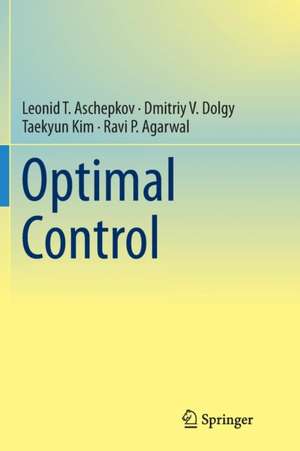Optimal Control
Autor Leonid T. Aschepkov, Dmitriy V. Dolgy, Taekyun Kim, Ravi P. Agarwalen Limba Engleză Paperback – 30 apr 2018
This book is based on lectures from a one-year course at the Far Eastern Federal University (Vladivostok, Russia) as well as on workshops on optimal control offered to students at various mathematical departments at the university level. The main themes of the theory of linear and nonlinear systems are considered, including the basic problem of establishing the necessary and sufficient conditions of optimal processes.
In the first part of the course, the theory of linear control systems is constructed on the basis of the separation theorem and the concept of a reachability set. The authors prove the closure of a reachability set in the class of piecewise continuous controls, and the problems of controllability, observability, identification, performance and terminal control are also considered. The second part of the course is devoted to nonlinear control systems. Using the method of variations and the Lagrange multipliers rule of nonlinear problems, the authors prove the Pontryagin maximum principle for problems with mobile ends of trajectories. Further exercises and a large number of additional tasks are provided for use as practical training in order for the reader to consolidate the theoretical material.
Preț: 384.31 lei
Nou
Puncte Express: 576
Preț estimativ în valută:
73.54€ • 76.97$ • 61.21£
73.54€ • 76.97$ • 61.21£
Carte tipărită la comandă
Livrare economică 31 martie-14 aprilie
Preluare comenzi: 021 569.72.76
Specificații
ISBN-13: 9783319842400
ISBN-10: 3319842404
Ilustrații: XV, 209 p. 55 illus.
Dimensiuni: 155 x 235 mm
Greutate: 0.33 kg
Ediția:Softcover reprint of the original 1st ed. 2016
Editura: Springer International Publishing
Colecția Springer
Locul publicării:Cham, Switzerland
ISBN-10: 3319842404
Ilustrații: XV, 209 p. 55 illus.
Dimensiuni: 155 x 235 mm
Greutate: 0.33 kg
Ediția:Softcover reprint of the original 1st ed. 2016
Editura: Springer International Publishing
Colecția Springer
Locul publicării:Cham, Switzerland
Cuprins
NOTATIONS.- PREFACE.- INTRODUCTION.- 1. Subject of optimal control.- 2. Mathematical model of controlled object.- 3. Reachability set.- 4. Controllability of linear systems.- 5. Minimum time problem.- 6. Synthesis of optimal system performance.- 7. The observability problem.- 8. Identification problem.- 9. Types of optimal control problems.- 10. Small increments of a trajectory.- 11. The simplest problem of optimal control.- 12. General optimal control problem.- 13. Sufficient optimality conditions.- CONCLUSION.- APPENDIX.- EXAMPLES OF TASKS AND SOLUTIONS.- LITERATURE.
Notă biografică
Leonid Aschepkov is a professor in the Department of Mathematical Methods of Economy at Far Eastern Federal University.
Dmitriy V. Dolgy is a professor at the Institute of Natural Sciences at Far Eastern Federal University in Vladivolstok, Russia and at Hanrimwon, Kwangwoon University in Seoul, Republic of Korea.
Taekyun Kim is a professor in the Department of Mathematics at the College ofNatural Science at Kwangwoon University.
Ravi P. Agarwal is a professor and the chair of the Department of Mathematics at Texas A&M University.
Textul de pe ultima copertă
This book is based on lectures from a one-year course at the Far Eastern Federal University (Vladivostok, Russia) as well as on workshops on optimal control offered to students at various mathematical departments at the university level. The main themes of the theory of linear and nonlinear systems are considered, including the basic problem of establishing the necessary and sufficient conditions of optimal processes.
In the first part of the course, the theory of linear control systems is constructed on the basis of the separation theorem and the concept of a reachability set. The authors prove the closure of a reachability set in the class of piecewise continuous controls, and the problems of controllability, observability, identification, performance and terminal control are also considered. The second part of the course is devoted to nonlinear control systems. Using the method of variations and the Lagrange multipliers rule of nonlinear problems, the authors prove the Pontryagin maximum principle for problems with mobile ends of trajectories. Further exercises and a large number of additional tasks are provided for use as practical training in order for the reader to consolidate the theoretical material.
Caracteristici
Offers thorough examination of control of linear systems and of nonlinear systems Includes numerous exercises and tasks to help students apply the material as well as selected solutions Perfect for a graduate, in-depth course on optimal control Includes supplementary material: sn.pub/extras
